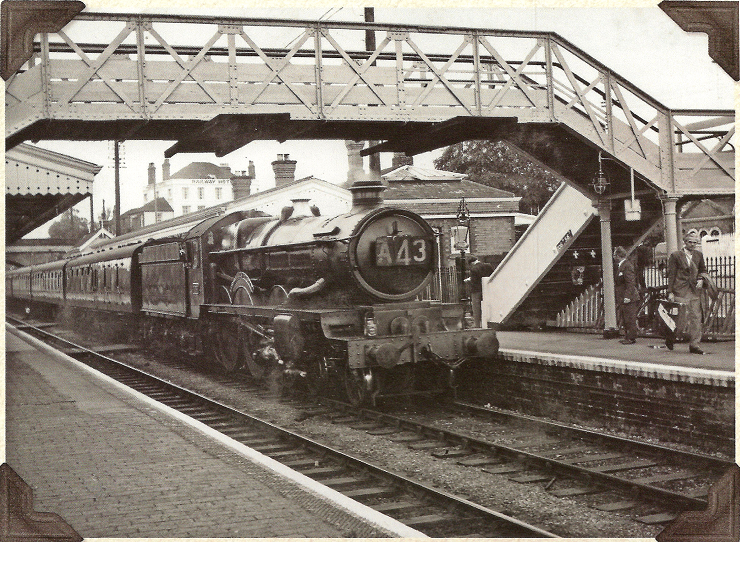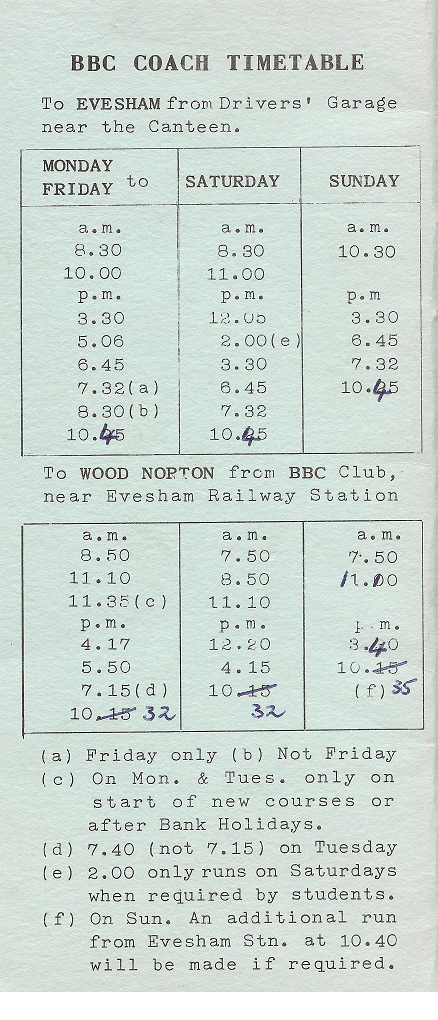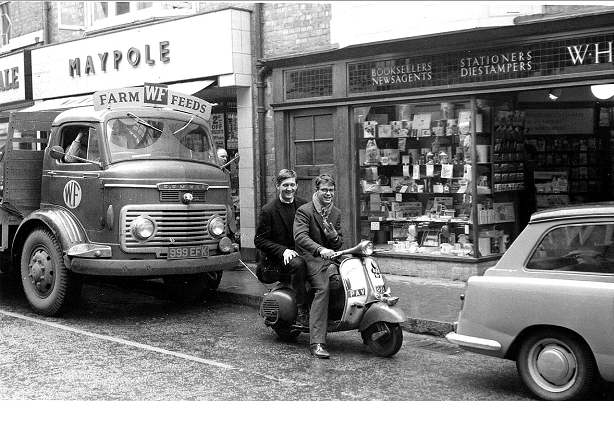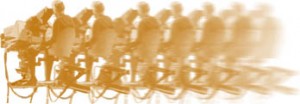Alec Bray
For those of us who went on T.O. courses at Evesham in the early nineteen-sixties and who did not have PMT (Personal Motorised Transport), the following picture may stir memories …
This scene could still be seen in 1963, and steam was still around until late 1965, but many of the Worcester/Hereford trains were being hauled by Diesel Hydraulics during this period… You were lucky to be steam hauled!
Some people may have travelled on that other rail route to and from Evesham – that is, not ex Great Western – from Birmingham and Redditch. If, in the picture above, you look beyond the man with a suitcase, you can just make out the arches of the windows of the Midland station.
The LMS tracks came into Evesham via a tunnel under the Midland Railway Hotel.
Many of us debunked from Wood Norton for the weekend, and caught the latest possible train back to Evesham on the Sunday evening – the latest possible being determined by the BBC Bus timetable (and they called it a coach !!) Off the train (with suitcase in hand), out the station, down the High Street to your awaiting charabanc.

The Fire instructions were printed (er, duplicated on a stencil duplicator) in RED. A bit of effort involved there.
Geoff Fletcher
When we arrived at Evesham in April 1964, the train had to pull forward after it had stopped, to allow one of our course members to get his motorbike out of the guards van.Graeme Wall
By the time I got to Evesham it was all “Warships”.Dave Mundy
Lovely to [think of] the charabanc which met me at Evesham Station on that fateful day in September 1961 which started me on my ‘Amazing Journey’ into broadcasting! Oh, the stories that it could tell! About how my room-mate travelled back to Colditz on the floor and wasn’t too well the next morning in lectures (I blame Jimmy Bruce for persuading Reg to supply Carlsberg Specials to the innocent Southerners who hadn’t been brought up on it!)I haven’t been able to trace the future careers of many of the attendees. Some I know about, Keith Wicks and I met again at the ‘disorganiseds’ thanks to Bernie’s website, Trevor Vaisey (my room mate in D block) is a friend of Geoff Fletcher of this parish, and we have swapped e-mails recently, he was also a cameraperson at Anglia. Ron Sproston was an SA at TVC, transferred to Manchester and sadly died alone. Peter Copeland ended up at the British Library as Head of the National Sound Archive and has a whole Wikipedia page to himself! He died in 2006. John Brown was a VS at Television Centre, lived near me in Hounslow and I went to his wedding. He left and went to the Isle of Wight to run a shop. Bob Stickland was an SA at TVC with me, Clive Bruce went to Manchester, Jimmy Guthrie (Glasgow, I think) married an Evesham girl (he was (in)famous for persuading Reg to get some Carlsberg Specials for the Club!), Chilly Ingles is still around in Edinburgh I believe, Derek Rae got terminated, after the course, for inflicting his black belt Judo knowledge on Chilly! Geoff Stafford was a TM in TVC Presentation at one time and ended up in Bristol where we used to meet on OBs in that region. Roger Kendall, my first room mate, before I evicted him!, became a lecturer at Wood Norton, I hear. Tony Giles, Mike Benson went to BH at first, the others I don’t know about.
Mike Giles
You were in illustrious company Dave. I worked with Peter Copeland in Bristol, sometimes in radio, but mostly in film dubbing. I didn’t appreciate how good a dubbing mixer he was until I worked in Sypher. Eccentric, to say the least, but brilliant. He developed diabetes, but for some time before it was diagnosed he devised Marmite jelly, and ate lots of it, which presumably provided a significant amount of his liquid intake. Peter was responsible for establishing a great deal of the protocol in handling the David Attenborough wildlife programmes, which followed throughout the prodigious Natural History output.Roger Long
Jim Guthrie was a very successful Film Unit Manager at Bristol. He was responsible for its huge expansion and entry into Network Drama, NHU, Music and Arts, Anthropology, TV features etc etcHe left in 1991 to form Films @ Bristol, one of the first indy post/dry hire companies in the UK.
Peter was our Dubbing mixer for many years before he left for the National Sound Archive. We experimented with him to get a continuity voice over with field actuality PTC. This involved Attenborough standing up, using a Tram microphone in the dubbing cubicle, rather than sitting in front of a AKG 451. We also tried Tannoys in comparison to LS5/8s. He was always interested in our location problems and produced seamless results from our ridiculous globe trotting
Pat Heigham
A feather in cap….For our compulsory programme to be put on, John Henshall discovered a Philips TK machine in a remote hut. We brushed off the dust and decided to shoot a film insert, dealing with the closure of the local branch line railway, recording the locals’ thoughts about this in a local pub, I then shot visual wallpaper to go with the audio.
A tutor who came from Bristol lent a Bell & Howell 16mm camera and found us some negative short ends, then had the stuff developed at the news dept. in Bristol.
Afterwards the lecturers asked us if we’d borrowed the insert from “Tonight”! (Cheek! Although the soundtrack, off 1/4 inch was running wild against the picture off TK, which was negative, and John managed to balance the shots with the knobs in reverse!).
I never travelled on the bus, as scrounged lifts with car-owners from London, until I had my own 4-wheels. Must have, though, as there was a trip to Aston University to see a demo of the Eidophor projector with material ‘up the line’ from TVC. The PA was handled by Birmingham Radio OB’s and was superb! Never heard better, to this day.
Once I got a lift with Mike McCarthy, and there were no oik spaces on the driveway, so Mike left the vehicle near the top. In the morning, the Warden (Major) tackled Mike with: “Mr. McCarthy – your car’s in the top ten!” Mike’s reply was: “Great! does it get gold hubcaps?”
The whole attitude of the BBC Wood Norton was little less than treating us like naughty prep school pupils. What was illuminating was how out of touch the tutors were regarding current studio practice. Previously, I had spent six months in TVC studios, frequently operating the main boom on sitcoms, and the advice imparted to us at WN was so out of date!
Carlsberg Specials!
I developed a taste for these, until a freelance corporate, “Freezing Fish on Shore” took me to Grimsby (the first 4 letters sums it up!). Stashed in the hotel, I found six CSs lined up on the bar. Next morning – horrendous hangover and into the cool warehouse which stank of fish long time deprived of their normal environment. I had to keep vanishing outside to hoick up!
Alec Bray
We made good use of that TK machine for TO 16’s programme. The Bell and Howell by this time had been replaced by a three lens turret Arriflex, and as I had set up my school’s film club, I was the first to get to grips with this (horrible) piece of kit: a tripod in the back of Chris Pocock’s sporty ragtop and filmed the run from the club in Evesham to the entrance to Wood Norton, slowing the camera as we went up the drive.The next shots (in the BBC club) were done by other people, following my dropping of said Arriflex. I got assigned (promoted, demoted, moved sideways, isolated (make your own spin!!)) to operate TK on the night of the program. Well, some one had to do it!
Ah! The thrill of “Run TK” at the start of a programme…
At Evesham, when we had to do the portrait lighting exercise, I wrote a critique of the portrait we made, going to town over the shadow thrown by the nose. The assignment came back with the laconic comment “…Typical television nose shadow…”
Pat Heigham
Remembering the portrait exercise, my partner for this was a dark-skinned chap, (actually the Head of Broadcasting in Nigeria, who were about to enter the world of TV, so he had been sent to the BBC to learn about it). This completely wrecked the usual contrast ratios of lighting a face, so I had to flannel about the difficulty of photographing a non-white subject. Maybe the powers-that-be learned something from my crit.I practised my lesson in portrait lighting by enticing girlfriends to sit for me.
Nick Ware
By the time I went on an STO course I had a 948cc Morris Minor of my own that could just about manage Fish Hill, so was able to ferry others home at weekends. Unfortunately it broke down during one home trip, but the local Morris garage (Puttocks) loaned me a Morris 1100 to get back to Evesham.The next Friday mass exodus I put the key in the ignition and drove it home. When I returned it to Puttocks and to collect my mended one they said “That’s not our car!”. Apparently the keys had fitted another 1100 in the Wood Norton car park belonging to someone else!
All was well though, because the rightful owner’s keys had fitted my loan car and got them home and back OK. Later in the week I found them both parked next to each other, but I never discovered who’s car I had “stolen”.
All three Evesham courses I attended were some of my happiest times and most treasured memories. I used my hand-written Evesham lecture notes for about ten years thereafter as the basis for my sound lectures to students on the Guildford School of Art, Film and TV course. Another Bob Foley connection, by the way.
What goes around, comes around!
John Bennett
I was on the first A course (A1) which started in June 1970.Tony Crake
Have a look at Evesham eng info photos and there … is …TA 21Graeme Wall
TO 31 from April 30th to Jul 28th 1969.John Howell
[Here] is a picture I took in Bridge Street Evesham in March or April 1963 during TO 15 at Wood Norton. Giving the salute of the day is none other than Dave Plowman of this parish and riding pillion is Mike Seddon.
Chris Pocock
My Initial Course at Evesham started 27th May 1963 – I think Alec was on itAlec Bray
Yup, I was indeed … We shared a room, you complained that I talked in my sleep! We used your car for filming part of the opening sequence on TK for our end-of-course programme. You were a star actor in that film. In the club at Evesham, cupping your ear to hear the phone call that was to summon us all back to Wood Norton to put on the show. Then a “race” in your car along the road to the Wood Norton gates, and as we swung through the gates, I changed the frame rate on the Arriflex to speed up our entry … Alas, having kept the film for many years, I cleared out part of the loft – including that film – some years ago.My regret is that I binned all my Evesham notes and ephemera before I found Bernie’s website and the Tech Ops people, so a copy of all your Evesham notes would be great. I think it would be a wonderful addition to the Tech Ops website – pace Bernie…
So I – and I hope others, too – would be very interested in all the other reprints and articles – for example, I recall that some time ago there was discussion here about the Mellotron (and its use on “Strawberry Fields”).
Pat Heigham
Of course, one of the things that has been ditched by the lack of any sensible training, now operated by the Corporation – NOT, was the training offered to staff directors, where they were given a studio and crew to make a programme.Thus everyone was singing from the same song sheet!
So sad!
Geoff Fletcher
What happens when we have all gone? No one will know how high were the standards to which we were taught, and worse still, I doubt anyone but a few will care.Money rules now – the dead grey hands and minds of accountants and moneymen lie like a pall over anything creative. It will only get worse I fear.
Bernie Newnham
Training comes from many different places these days. I recently wrote this for the ITTP –It’s a very British story, usually told about inventors, but maybe also about innovators…..
“… We had an idea, a really good idea. We took it around to show people – the meeting rooms of the big TV players, exhibition stands to talk to the smaller companies and others. All the big boys and girls – and the small ones – said: “Great stuff, you should do this – make it happen”.
“We will”, we said, “we will – we really think it needs doing, as do you. Ummm – just one tiny thing – we could do with some money to get started. Not very much at all in terms of your profits, you won’t even notice….”
…And that’s where we ground to a halt.
What we had suggested was that the technical end of the UK TV industry needs to set some basic standards for newcomers. Just like, in the wider world, the accountants, and the plumbers and the pharmacists, and, and…”
Not overly original, but in the technical end of modern TV making, ground breaking.
Once upon a time, long long ago, people destined for cameras, sound, engineering etc, in the UK TV industry learned at the BBC. It’s still a badge of competence – “What Evesham course were you on?” Not quite a secret society, no obscure handshakes, but an instant camaraderie, and a reasonable guarantee that the person you’re speaking to has passed through a system that made sure they have a competent way of working. An understanding of their area of work that means that the job gets done properly. Evesham is still there – I think – but training has long ago passed to a legion of universities and other training establishments. There’s good, bad and indifferent – what there isn’t is an accepted set of standards for the leavers to reach.
A while back a group of us got together and formed the ITTP – the Institute for Training in Television Production. We asked – “Has anyone else noticed that incomers don’t have the basics any more?” “Oh yes!”, said everyone. “Ohms Law, what’s that?” said students. So we worked on it, and it lead to the ITTP Approved Skills Scheme – basically a list of the skills needed from starters. Nothing fancy, nothing that someone who had done 14 weeks at BBC Evesham wouldn’t have – and someone after three years at university really, really should have. You can find the list on line – ITTP.pdf It was put together with a lot of help from current practitioners, and we regard it as work in progress. TV changes, technology changes, and so should the standards for newcomers.
Training comes from many places these days. The Approved Skills Scheme doesn’t care, any more than the driving test examiner. At the end of training each starter would pass appropriate theory and practical tests and then receive accreditation that any potential employer can accept. Just like the accountants, plumbers, pharmacists, electricians etc etc. Universities love the idea, just like the employers. Something that they can work to. It just needs money to develop.
Now, finally, just possibly, there’s a chance of advancement. The IMIS, once the BKSTS, has offered some possibilities, maybe a way to get this done. It just a pity that the big industry players – those who will benefit – haven’t put their money where their mouths are.
Nick Ware
I’m sure we all look back on BBC training, and Evesham in particular with a fair degree of nostalgia. [I wrote about my] first impression of Wood Norton, in a letter home soon after arrival there – a letter kept all this time by my Mum, and given to me shortly before she died. I vividly remember that we were definitely encouraged to believe that no-one outside the Beeb could possibly know anything about TV in those days!First Letter Home
Chris Woolf
I have enormous respect for Evesham training, and benefited from it wonderfully, but the BBC did tend to imagine it had a monopoly on everything involved with “good broadcasting”. People trained elsewhere, and the use of non-BBC equipment such as VUs, and non-constant impedance interfaces for audio, couldn’t be acceptable.This attitude retained some of the imperial thinking of Britain from the last century or so, and did the BBC no favours. Indeed I think it made it easier for the likes of Birt to bring about the brutal and destructive changes that he wrought. The organisation needed reshaping, but not his method of doing it.
John Cox
Referring to Nick Ware’s … quote “…that no one outside the Beeb could possibly know anything about TV in those days…”.It WAS so ten years before. Len Mathews started to recruit staff for the new commercial stations in 1953/4 from offices at the lower end of the Aldwych near the Strand in London. The salary offered was DOUBLE that anyone in the BBC earned. The only people who knew anything about TV WAS in the BBC.
A lot of engineers were attracted to the offer. It was quite interesting to be working at a Cup Final with someone on the commercial side whom you had been working with in the BBC a few weeks before, nevertheless we were very friendly and the engineers would offer our facilities to them. The production people did not like this and we became less friendly. The leaving of so many persons from the BBC became so great that the corporation issued contracts to senior engineers C plus and above for them to stay. Doctor Sturley at Wood Norton was very disturbed because students were joining the BBC just for the training and leaving to go to commercial as soon as they had passed.
In those days 1954/6 was really great. On Outside Broadcasts we were feted and welcomed everywhere we went. Within a month of leaving the R A F I was back at Odiham RAF station (just to test a Radio Link) where an officer was appointed to look after me and pay for my meals and I was chatting to the Group Captain as if I had know him for years.
But it didn’t last. With the coming of rivals a lot of other companies started up, Race Course Finishing and many such like. When promoters realized this I noticed that we were gradually being pushed from our prime positions to less salubrious places. We were NOT welcomed as in previous times.
After many years mostly happy with the BBC I took early retirement and would keep quiet about my employment until I came back to Devon where I was asked to give a talk about the BBC and now I am proud to have worked for them.



